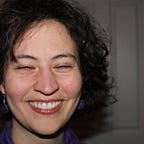Where was I going again?: Finding meaning and focus when Brain Fog sets in
Between the butter and the bulk foods, I forgot why I was headed in that direction. I did not have a grocery list, so I stopped in my tracks. I mentally retraced my steps for clues about what I might have wanted next. Still, no recall.
I kept walking towards bulk foods as I passively scanned the aisles for hints of why I was there. Then I saw the onions. Ah, onions! Just past bulk foods, in produce, there were onions and I was on the hunt for them. I could relax.
Welcome to “brain fog”. It’s a common symptom of many chronic illnesses and often appears as a side effect of systemic inflammation or hormonal changes. It’s like flying along in a jet with a clear navigational direction and then suddenly ending up in a cloud bank with no radio signal. You just have to keep cruising and hope for the best. When the sun comes out on the other side, you’ll know where you’re going again.
If I am not fastidious about my sleeping and eating habits, this will happen to me many times per day. I could let it upset me, frustrate me, or make me feel helpless, but I’ve decided to ride the wave. Brain fog is instant access to the liminal space: that space between focused, conscious intention and full-on dreaming.
I know what you’re going to say: “I don’t want access to the liminal space, I just want to get an onion, not look like a lost child in the grocery store aisle, and get home in time to use the onion to make dinner before I forget what I was going to make in the first place.”
“All good points,” I will say back, “but you have brain fog, so in the moment you gotta work with what you got.”
What if that state, that dreamy, forgetful, non-linear, foggy state, was actually useful? What if there was some information in there that you couldn’t access through your everyday mind? What if you could work with this slightly unconscious state, consciously? It’s one of my favorite things to try.
At the grocery store, I used two methods: suspending time, and expanding my awareness of space. Instead of fighting hard to get my memory back, I just stopped in my tracks. I opened my awareness to everything around me and allowed myself to take in the general big picture instead of the one-track goal orientation I had had before. I let go of my attachment to the timing of completing my task. This did not actually slow me down. It was fun, a momentary high, a release from the pressures of agreed-upon reality.
I often find that this foggy state wants me to notice something else, something happening in my world that I was missing because I was headed in a certain direction. If I surrender to it for a moment, I can find some treasures.
It also makes me kinder. When I’m on my game, task-focused and quick, I can forget what it’s like to be vulnerable, to make mistakes, to be forgetful. I can become impatient with others who aren’t on my same wavelength. But when the fog rolls in, I’m forced to be in the moment, to remember how fleeting that moment is and how little control I actually have over it. I want others to be kind to me when I pause, forget things, or make mistakes. I remember that I can also extend that kindness to others. I can lend them some of my fog.
Sometimes I forget people’s names, even the names of people I see regularly and know well. Names of students, clients, colleagues, teachers, classmates. It’s potentially embarrassing at times, but again I’m learning to make friends with the fog.
I’ve found that when I cannot remember their names, I can often see their faces behind my eyes as clearly as if they were standing right in front of me. I ask myself, “What do I notice about this person? What do I need to see in them?”
Something will always jump out at me. That sadness at the corner of their eye, the brightness of the scarf I imagine them wearing, the wildness of their hairstyle. I allow that to momentarily be more interesting than their name. There’s something there about the essence of who they are, or who they are to me.
I also notice how I go about remembering their name — what is the sequence of connections I use to link this image of who they are to the name I associate with them? What kind of information is in that sequence? Is there something I need to pay more attention to? Maybe there is.
I’m not saying that brain fog is always fun, but I am saying that it’s always an invitation. An invitation to welcome more of the liminal space into our lives, an invitation to notice the finer details about those close to us, to remember to give and receive patience and kindness. The next time brain fog sets in, see what happens if you greet it by becoming a little foggy yourself, and let me know how it goes!
